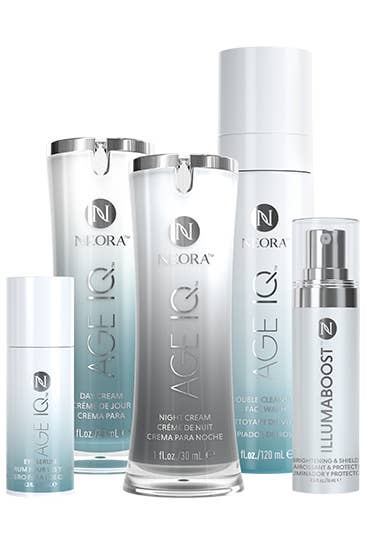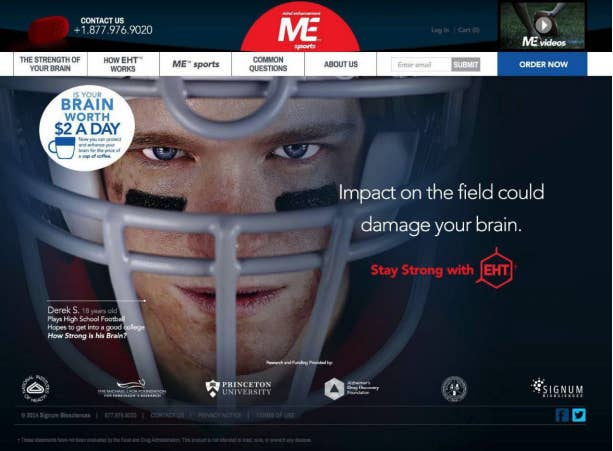
The Federal Trade Commission filed a lawsuit on Friday claiming that skincare and wellness company Neora is actually an illegal pyramid scheme.
Neora allegedly made false claims that its supplements could prevent chronic traumatic encephalopathy, a brain disease caused by repeated concussions. It also allegedly claimed that one of its supplements was endorsed for Parkinson’s disease prevention by the Michael J. Fox Foundation, which it was not.
Neora, formerly called Nerium, sells "anti-aging" face creams and supplements through multilevel marketing, similar to Mary Kay or Amway, in which people sell products to their friends and family members and can earn money for recruiting new vendors. MLMs are legal, but the FTC said that Neora’s business model drifted into a pyramid scheme: People made more money recruiting new sellers than they did by selling the actual product.
According to the lawsuit, only about 5% of people who became sellers for the Texas-based Neora ever made any money at all. New vendors were required to buy starter packages ranging from $500 to $1,000 of products, immediately putting them in debt that the vast majority of sellers never climbed out of. A vendor would receive 25% off the retail price of merchandise if they bought a monthly auto-shipment of inventory to sell. This meant that in order to make any profit margin at all, they needed to agree to the auto-shipment. Many people wound up paying for way more products than they could actually sell that month.
Making things even harder for the sellers, Neora products are available for sale directly on the Neora.com website as well as Amazon, which means customers don’t need to go through a “brand partner” vendor to get the products.
Sellers also recruit new sellers — and, according to the lawsuit, they are incentivized by bigger commissions by recruiting a “downline” of vendors to whom they would sell Neora products. The FTC considers this triangular structure, plus the company's exaggerated claims about how much income a seller could earn, one of the telltale signs of a pyramid scheme and a violation of the FTC Act.
On the very same day, Neora filed a countersuit against the FTC, claiming that the federal agency was overreaching and conflating MLMs with pyramid schemes. “The FTC has yet to provide any data to substantiate their outrageous claims against our business model,” Anna Proctor, a spokesperson for Neora, told BuzzFeed News. “Neora has complied with all laws and the FTC’s most recent 2018 business guidance regarding direct sales business models, and is in no way a pyramid scheme.”

The other part of the FTC suit focuses on a Neora supplement called EHT, which the company claimed could prevent or reduce the risk of CTE, a risk for people who play contact sports like football, soccer, or hockey. Although the supplement was made by a separate company called Signum, the FTC said that Neora collaborated with Signum on its marketing plans for EHT, and leveraged the Neora salespeople to promote the product, as well as hiring several former NFL players —including Vikings and Seahawks wide receiver Sidney Rice and New York Giants punter Steve Weatherford — to promote EHT.
I'm donating my brain post mortem for scientific research. Think about your brain health and check out @MEsportsUSA. #EHT
Former NFL player Steve Weatherford endorsed the EHT supplements.
A representative for Neora pointed out that the FTC’s lawsuit focuses on false health claims made on the website for ME Sports, a branded version of the EHT supplement made by Signum before it formally partnered with Neora. The FTC’s lawsuit points out that a press release from Signum touting the same health claims of its EHT products was written by Neora’s public relations team. On Facebook, business pages for individual Neora sellers have made posts that link to the ME Sports website and promote the product.
Truth in Advertising, a consumer advocacy group, sent a letter to the FTC about Neora in 2016, and has been archiving a collection of its exaggerated claims about how much money sellers earn, as well as the false health claims about EHT.
“From its inception, Nerium [Neora] has violated the law with reckless disease-treatment claims and wildly inappropriate income representations,” Bonnie Patten, executive director of Truth in Advertising, told BuzzFeed News. “Given the number of illegal claims made by [Neora] and its distributors, it’s no wonder the FTC felt compelled to bring a lawsuit against it and its founder.”
